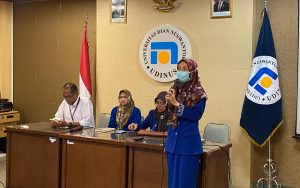In the holy month of Ramadan, suhoor is important in preparing our body before fasting. However, in recent times, rumors regarding ORS have spread on the Internet, particularly regarding ORS being capable of preventing dehydration during fasting. Vida Ana Veria Setyawati, S.Gz., M. Gizi., a nutrient expert from Universitas Dian Nuswantoro (Udinus), shared her thoughts in response to this whole issue.
Vilda commented that she did not recommend the usage of ORS during suhoor. According to her, ORS could merely prevent dehydration if the users suffered from diarrhea beforehand, not to prevent dehydration during fasting.
“I disagree with the usage of ORS for fasting. This is because ORS is used to handle dehydration caused by diarrhea, not to prevent diarrhea,” Vida explained.
Vilda further added that high consumption of ORS could potentially trigger an illness. She elaborated that ORS consisted of two substances, namely, electrolyte and carbohydrate.
Consuming ORS in a high dosage could trigger an increase in electrolytes. In addition, regular people consume approximately four tbsp of sugar and a tbsp of salt daily.
“The increase in electrolytes has something to do with the increase of tension and sugar inside our body. We must know full well regarding the consumption of sugar and salt to prevent both overnatrium and overglucose,” she explained.
Vida indeed did not agree with the usage of ORS to prevent dehydration during fasting. Instead, she suggested focusing on maintaining our needs for water by drinking two liters or eight glasses of water daily.
“I would suggest handling dehydration by drinking two glasses of water during suhoor, four glasses during iftar, and two glasses at night,” she concluded. (Humas Udinus/Alex. Foto: Humas Udinus)







